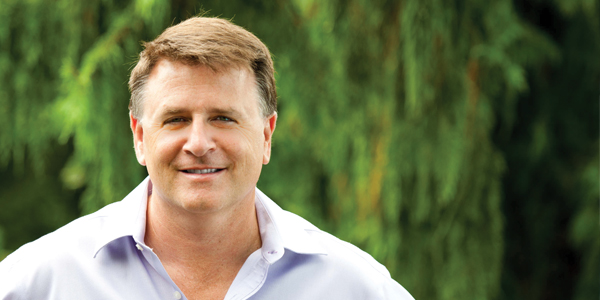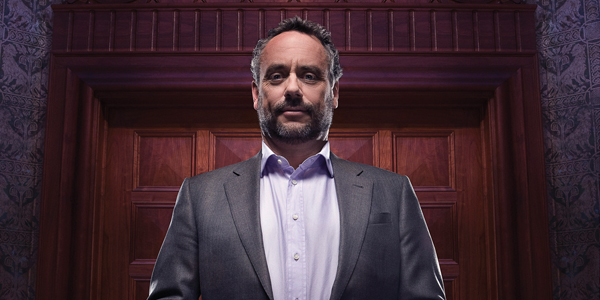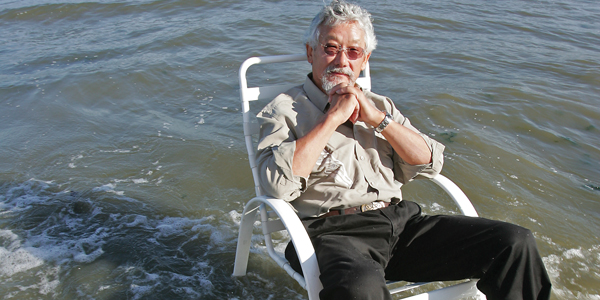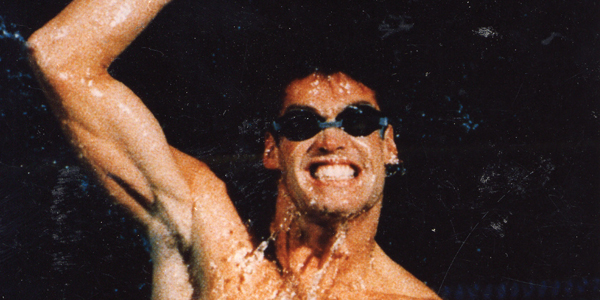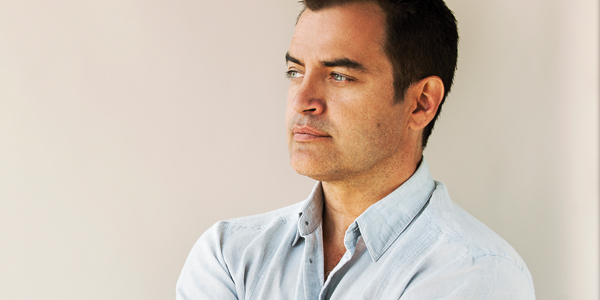Ten years ago I picked up the phone and called David Chilton, author of Canada’s all-time bestselling book, The Wealthy Barber. He answered on the first ring, spoke quickly, and politely declined my initial request for a meeting. It was a very brief exchange. I recall little more than spitting out half-processed answers in an effort to keep up to the barrage of his questions. Somehow, at the end of the call, he agreed to meet; my passionate pitch had secured an opportunity to share a coffee.
I met a man driven by data, insatiably curious, equally intuitive and analytical, with an impeccable sense of timing for delivering a punch line. Over the years, I’ve come to appreciate his belief in luck, his sense of gratitude, how he understands that more “stuff” doesn’t mean more happiness. His 1,300-square-foot home, “without garage”, is for real. I’ve seen it.
I’ve come to know him as the kind of guy people love to be around. He has a kind heart. He can shift the energy in a room, and that’s what makes him such a powerful communicator. He has cachet, and for me, that’s different than charisma. Charisma can be defined; what David has can’t easily be labelled. What I can say with certainty, is that he’s had a profound impact on those who have read his books, heard him speak, and met him in person.
David went on to publish the bestselling cookbooks: Looneyspoons, Crazy Plates, and Eat, Shrink & Be Merry, (with authors Janet and Greta Podleski) and most recently, The Wealthy Barber Returns. In his spare time he has challenged, coached, and invested in hundreds of entrepreneurs because, well, my sense is, he can’t help himself – it’s innate.
By the time you read this interview, you will have been introduced to David, the newest “dragon” on CBC’s “Dragons’ Den”. I predict you will meet the same man I have come to know and respect – a remarkable man who, having achieved his own dreams, has the unique ability to predict and invest in entrepreneurs who have the capacity to achieve their own.
So are you living the dream or what?
Well, I’ve been enjoying things; I’ve been lucky my whole career. There have been very few things, in fact only one, that I haven’t enjoyed, and that was running the frozen food company. It’s because I wasn’t very good at it. (Laughing) It’s not fun doing something you’re not good at, but everything else, I’ve really liked. Being involved with Janet and Greta, writing The Wealthy Barber, having a few side projects, and now “Dragons’ Den”…I’ve been very, very fortunate.
I know it took you a little bit of time to decide if you were going to join “Dragons’ Den”. What was your greatest fear?
I’m very low key. I live in a small, humble home. I try to stay out of the limelight. I knew my choice to join “Dragons’ Den” was going to change my life significantly, so I had mixed feelings about it initially. But, I’m really, really glad that I said, “yes”. The key turning-point was my audition. After CBC originally called me, they asked if I could come in for a rehearsal/audition and I’m so glad that I did. I loved it! In fact, the whole time I was there, I got lost in the pitches. I was drawn in emotionally. I was thinking about the businesses and asking questions and deciding if I wanted to invest. (Because we were allowed to invest, even at the rehearsal.) By the time I left the stage, I knew I wanted to do it, and I’m so glad it worked out.
Well, you know, I phoned you many years ago looking for advice and after we met I realized that helping entrepreneurs is something completely innate for you; it just comes naturally.
Yeah, it’s true. People have been pitching ideas to us for years and years. I was laughing at how many businesses have come our way over time. And the pitches haven’t been that different than those pitched on “Dragons’ Den”. I’ve looked at so many businesses over the years and have had the opportunity to get involved with so many of them. I’m grateful, because they’ve all helped me learn about so many diverse industries. In fact, my involvement with Janet and Greta was probably more impactful than my involvement with The Wealthy Barber. With The Wealthy Barber, the model was really straight forward. It was basically, write the book and then do a tremendous number of interviews. That was it. But, with Janet and Greta, they got involved in food products, television, greeting cards, and a couple of other things, so I was learning about so many different areas; different forms of distribution, different forms of marketing, different margins, different partners. And, I think this wide array of experience has helped me bring more to “Dragons’ Den”.
Absolutely. That’s how it is in business. Every experience adds up to the one you’re in, and you just never know…
You’re right; you don’t ever know. It all leads in different directions. This was a good time in my life for this to come, too. I mean, it came at a bit of an awkward time, in that it was at the end of my tour for, The Wealthy Barber Returns. But, in terms of me having a bit of extra time going forward, and looking for something new and exciting, this has been a very good fit.
And, I love entrepreneurship. Truthfully, I’ve been speaking more and more about it in the last few years, and less and less about finance. And, so, there were a lot of things that came into play at the exact right time, and it was great. The experience of doing “Dragons’ Den” on a scale of 1 to 10, was a true 10. I love the people. You’ve interviewed Arlene so you know how wonderful she is to work with; she’s a very holistic thinker. So, I enjoyed that. And then, Jim, well, he’s just a gentleman. Bruce and I can see being friends for a long time. We have very similar thinking patterns. And I really enjoy Kevin. I really like his sense of humour! He caught me off guard; I had no idea how funny he is.
What did you learn about yourself being on the show?
One of the things that I found fascinating was how I gravitated toward more low-tech businesses than high-tech. I’m always sceptical about high-tech businesses because I don’t have a background there and the speed of competition is so quick, so fierce. I think it’s difficult to forecast going forward. It’s hard enough for any business, but it’s particularly hard for high-tech companies. So, when the low-tech companies pitch, that’s when I can say, “Okay, I get this. I can understand it; I can relate.”
But the other thing that really caught me off guard, took place after the taping was over. While on the show I was thinking, “Well, I don’t have as many contacts as the other Dragons,” or, “He’s been around forever – he knows everyone” – that type of thinking. But, then when I did the deals and made calls to people in distribution, or people in marketing, people in supply, I realized that being the “Wealthy Barber” for 25 years and speaking at all the big companies thousands of times, allowed me to pick up the phone and open the doors for those I’ve made a deal with.
And, so what’s the first question that runs through your head when you hear a pitch? What’s that first thing you’re measuring?
What’s their passion? What are they like? Are they articulate? Can they command the language well enough to describe the idea? Enthusiasm is infectious. Past the passion piece, I’m asking, “How are they going to get their customers?” Even if they have a good idea, it’s often very expensive to go out and get customers. So, in the back of my mind, I’m constantly thinking, “I like the idea, I like the entrepreneur, but what’s it going to cost to get the attention of a consumer and get the product on the shelf?”
It’s interesting, because when you watch the BBC version of “Dragons’ Den”, or even when you watch “Shark Tank”, a lot of the investors are focused on what doors they can open, what stores they can get the product into; where they can distribute.
I’m a little different because I’m not thinking about whether I can get it on the shelf – that’s a given. The real question is, “How do we get it off the shelf?” That’s the tricky part! (Laughing)
In the back of my mind, I’m wondering how we’re going to get the target audience to hear about it, test it, and hopefully come back and buy it over and over and over again. At the same time, I’m doing the math. I’m running the numbers through my head to see if it’s viable. You wouldn’t believe how many things are running though your head at the same time! You’re listening to your own thoughts, you’re listening to what the other Dragons are asking, what some of the answers are. You’re actually trying to figure out what the other Dragons are thinking, because that is a whole part of your decision process. You’re arguing back and forth; you’re watching body language.
One of the things I didn’t do particularly well was let go of the previous pitch. It’s hard not to. After the first morning of taping, I didn’t take my BlackBerry on set. I realized even my emails were distracting and I needed every bit of focus to be present to get to the bottom of things. It was a fascinating process.
If we’re talking about the essence of the entrepreneur instead of the actual product or service that’s being pitched, is there one trait that you value above others?
Well, I certainly gravitated, like most of the Dragons do, toward the people who are on top of their math. Yes, the person has to have an infectious enthusiasm and a great product or service, but when someone comes out there and doesn’t know the math at all, they don’t know their gross margins, or where they can get volume discounts, or cost of goods sold – it’s hard to be confident in that person.
I find the best entrepreneurs are incredibly detail-oriented and that’s across the board. I mean this is what drives their success. Ideas are great, but success lies in the execution.
When people come out and they really know their business – they know everything they’re talking about – that’s inspiring. I can think of one pitch in particular, they knew their business cold. Every one of us thought it was a good idea and we all wanted a piece of it. I think four Dragons ended up fighting over it. Just the fact that they had a good idea, and that they were so on top of it, inspired our confidence.
I know one of the great things that you’ve been advocating through The Wealthy Barber is a get-rich-slowly strategy. I’m wondering if you apply this strategy on “Dragons’ Den”?
Well, I mean these are really “slow investments”. You’re investing in small companies, with no liquidity. You can’t sell them at a public exchange. With these, you have to be extremely patient. And if businesses are successful, they’re not born over night. It’s years of pain, and anything that can go wrong, will go wrong. Every Dragon is an entrepreneur, so we’re all on the same page about being realistic about that.
Most of us get upset when people come on and paint a very rosy picture of how smoothly it’s going to go. We’re experienced enough to know that it’s not going to go that way. And so, patience is a natural part of this process. No one on the panel is looking to get rich quickly off of these investments.
So, how much of success do you think is a function of timing?
Well, I think timing is certainly key, especially for me. I was so lucky. I mean, I came out with The Wealthy Barber when the Baby Boomers were entering their savings years, interest rates were starting to drop, and people were looking beyond just GICs. So, I think timing is important. And, I think frankly, luck can play a big role in life. If I look at my life, I had fantastic parents. I’m extremely healthy. Things come around at the right place, and the right time.
Success begets success. Once you start getting on a roll, then you’re more likely to run into the people that will fuel your success. Momentum feeds off itself.
If you had to state in one word what you’re most grateful for, what would you say?
It would be my energy. I think I lucked out, through no effort of my own. I don’t remember being a particularly high-energy kid. I was normal, maybe even lazy. It’s when I got involved with the world of finance, that the energy kicked in.
How do you define your own wealth? Is it in monetary terms or something else?
Not at all in monetary terms. You know what’s really funny? I’m one of the least money-oriented people you’ll ever meet. I don’t even think about my money. I live an incredibly modest life. I live in a little house outside of Waterloo. I only have one car. I don’t even have a garage. I didn’t spoil the kids, too, too much. I don’t think about stuff like that; I don’t really care about it – it does nothing for me. When I think of me living a wealthy life, it’s all around friendships and health, and the fact that I’ve enjoyed my career. I’ve been lucky that I’ve done very well. But, financially, I don’t think about that very much at all.
If you and I both agree that “stuff” doesn’t increase your happiness, then what does?
I think in my case, curiosity is linked to my happiness. I find that I’m always curious about different things. About people, about why things happen the way they do. I love to read, I love to learn. When you’re curious, everything is interesting. I think that’s the link for me to happiness. My whole family is kind of like that.
What is the most common business advice that you tend to give people?
To pay attention to the little things – the importance of detail. I would say that’s it, more than anything else. If I think of my most successful entrepreneurial friends, that’s the common denominator. They have high energy too, but it’s the attention to detail. They’re fanatical about the little things. And because they’re so detail oriented they aren’t good delegators; they tend to be a bit controlling. I’m that way. A perfect balance is maintaining that strong attention to detail, but also delegating to people who share that passion for detail. For the most part, a lot of successful entrepreneurs battle that.
And, when you think back over the years, what great business advice was gifted to you? Is there something that definitely struck a chord?
You know, there’s no one piece of advice; no one book that has made a big difference. I think it’s just the constant thirst for information, and just reading. I always think. My kids laugh, but I sit in my chair at work, and just think. I still go for a lot of car rides so I can think things through. Trying to get creative, and use ideas that you’ve seen elsewhere and borrow them, and massage them, putting different ideas together is a big link to success. You don’t necessarily think of them, but you come up with the unusual combination.
I think one thing that has helped me in my career, is that I’ve artfully avoided meetings. I really have worked hard at that. I mean, you have to go to some obviously, but I go to very few.
Yes, time is your greatest asset.
It is. I just find meetings for the most part aren’t that productive. And I use phone calls, I keep them short.
When we talk about Americans and Canadians, (because we have readership in both countries) have you seen a difference in terms of how Canadians and Americans relate to entrepreneurship?
Yeah, I think unfortunately the stereotype is a bit accurate. The American culture seems to celebrate entrepreneurs a little bit more. The American entrepreneur is more willing to pick up the phone and ask questions of someone who is already doing what they hope to do. They seem more aggressive in garnering information from people who have already been there. It’s interesting, in the States, I’ve had four or five major publishing firms call our office and say, “Hey, can you come down to our office and speak to our troops about how you guys did what you did with the cookbook model?” I’ve never had a Canadian publishing firm contact me on that.
I’ve had the opposite experience. When I am speaking to U.S. audiences, I love sharing how I’m a product of my environment, specifically, this region. I have felt that I can pick up the phone and call anybody, anytime, about anything. And, you were one of those people. The response has been amazing. There isn’t a sense of scarcity, instead there’s a sense that there’s enough success for everyone.
I couldn’t agree with you more. I think that Waterloo Region is unique that way.
It is. And, my entrepreneurial journey has been greatly influenced by those in my community who have been willing to share what they know in each industry I’ve entered. Sharing this with U.S. audiences has been met with blank stares. It doesn’t seem to be their experience.
I think the Waterloo Region, is unique in attitude. There has always been a spirit of cooperation here and a spirit of community. If you were going to start a restaurant here, you could easily phone up the Charcoal guys and they’d sit down and help you despite that fact that you’d be their competitor. Co-operation begets co-operation. Once you get momentum on that front, then it becomes part of the local culture.
What’s one piece of advice that you think would fundamentally change the world as we know it?
If there’s one observation I have, that could fundamentally change the world, it’s that there is no one piece of advice that can fundamentally change the world. (Laughter) I mean, there are a lot of issues out there, and they require a lot of different solutions. The complexity of the world now is almost overwhelming. In fact, one of the fears I have, is that the world is so big, in terms of population and business size, government size – there are so many moving parts that it’s very difficult to make all of it flow. We’re seeing this with central banks and governments throughout the world
right now.
I think you have to do a lot of things simultaneously and everyday you wake up with the belief that you can do better. I think a lot of people I know who are successful are very much interested, they’re curious and they’re on top of current events, but they focus their energy on their centre of influence. They tend not to worry about the big picture events, but they’re very aware of them. I think that’s a common denominator that you see amongst successful people. My father is a great example. He keeps me up-to-date about political events, but doesn’t stress about them. He puts his energy and his focus on things that he can impact; for example, his bridge game. (Laughing)
Yeah, I’ve never been a one-piece-of-advice-kind-of guy. I think in some ways, those kinds of things can give people a false impression that there are magic bullets out there.
I think it’s quite the opposite when you get into business. Whether it’s your relationships, your parenting, or whatever else, there are a series of decisions and it’s an outgoing effort involving different solutions at different times. I wish the world was a simple, “Hey, if you could just do this one thing, you’re good to go”, but I don’t believe it is.
I think the question is important to ask because in order to answer it, each individual needs to peel away the layers to a core belief system. You answered, in not so many words, that change takes place when we have a macro view of the world, but we take micro action. We start at our centre of influence; that’s the core of where change takes place.
That’s true. You don’t meet very many people who are really successful living in a vacuum. Most successful people are pretty knowledgeable about what’s happening in the world around. They’re not stressed necessarily about it, just aware. It seems to me that those who have done well around me, and I don’t mean “done well” just financially, they’ve done well in their life – are just plain curious. I mean, I think that’s the common denominator here. If I sat down with 20 people and interviewed them, and said: “What are the keys to success?” I predict they’d say tenacity, perseverance, intelligence, contacts, or that kind of thing.
But yet what I have found has made all the difference in my life and my success, is my curiosity.
I tweeted something yesterday – I threw it out there. And I was amazed by how many re-tweets it got. I asked, “What’s the most important skill an entrepreneur has to have???” It generated a lot of discussion. People noted business plans, being able to manage people, and on and on. The truest answer is, they need customers, and do they have the skill to get them? It’s the one thing to watch for in “Dragons’ Den”. Is this person going to figure out how to get customers? That’s the hardest part.
Absolutely it is! Thank you, as always, for sharing your time and wisdom with me, and today, for sharing it with our readers. Wishing you all the luck on “Dragons’ Den”!

